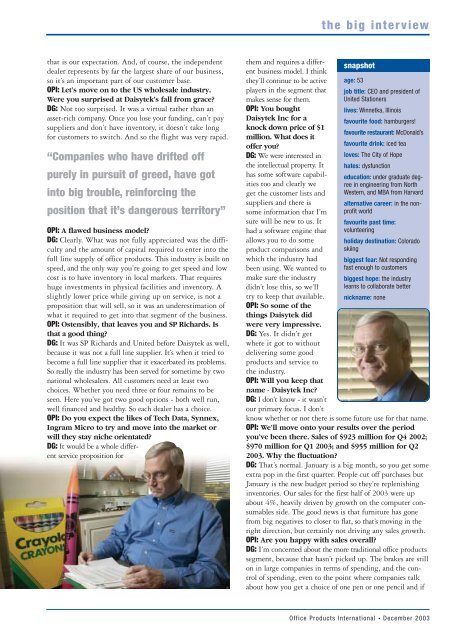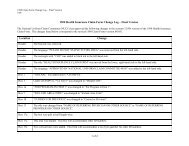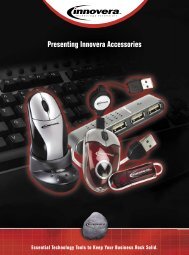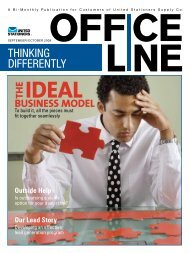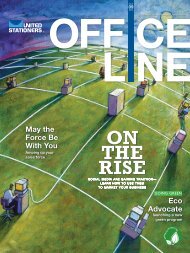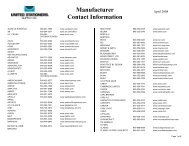OPI-Dick Gochnauer Interview - Ussco.com
OPI-Dick Gochnauer Interview - Ussco.com
OPI-Dick Gochnauer Interview - Ussco.com
Create successful ePaper yourself
Turn your PDF publications into a flip-book with our unique Google optimized e-Paper software.
the big interview<br />
that is our expectation. And, of course, the independent<br />
dealer represents by far the largest share of our business,<br />
so it’s an important part of our customer base.<br />
<strong>OPI</strong>: Let’s move on to the US wholesale industry.<br />
Were you surprised at Daisytek’s fall from grace?<br />
DG: Not too surprised. It was a virtual rather than an<br />
asset-rich <strong>com</strong>pany. Once you lose your funding, can’t pay<br />
suppliers and don’t have inventory, it doesn’t take long<br />
for customers to switch. And so the flight was very rapid.<br />
“Companies who have drifted off<br />
purely in pursuit of greed, have got<br />
into big trouble, reinforcing the<br />
position that it’s dangerous territory”<br />
<strong>OPI</strong>: A flawed business model?<br />
DG: Clearly. What was not fully appreciated was the difficulty<br />
and the amount of capital required to enter into the<br />
full line supply of office products. This industry is built on<br />
speed, and the only way you’re going to get speed and low<br />
cost is to have inventory in local markets. That requires<br />
huge investments in physical facilities and inventory. A<br />
slightly lower price while giving up on service, is not a<br />
proposition that will sell, so it was an underestimation of<br />
what it required to get into that segment of the business.<br />
<strong>OPI</strong>: Ostensibly, that leaves you and SP Richards. Is<br />
that a good thing?<br />
DG: It was SP Richards and United before Daisytek as well,<br />
because it was not a full line supplier. It’s when it tried to<br />
be<strong>com</strong>e a full line supplier that it exacerbated its problems.<br />
So really the industry has been served for sometime by two<br />
national wholesalers. All customers need at least two<br />
choices. Whether you need three or four remains to be<br />
seen. Here you’ve got two good options - both well run,<br />
well financed and healthy. So each dealer has a choice.<br />
<strong>OPI</strong>: Do you expect the likes of Tech Data, Synnex,<br />
Ingram Micro to try and move into the market or<br />
will they stay niche orientated?<br />
DG: It would be a whole different<br />
service proposition for<br />
them and requires a different<br />
business model. I think<br />
they’ll continue to be active<br />
players in the segment that<br />
makes sense for them.<br />
<strong>OPI</strong>: You bought<br />
Daisytek Inc for a<br />
knock down price of $1<br />
million. What does it<br />
offer you?<br />
DG: We were interested in<br />
the intellectual property. It<br />
has some software capabilities<br />
too and clearly we<br />
get the customer lists and<br />
suppliers and there is<br />
some information that I’m<br />
sure will be new to us. It<br />
had a software engine that<br />
allows you to do some<br />
product <strong>com</strong>parisons and<br />
which the industry had<br />
been using. We wanted to<br />
make sure the industry<br />
didn’t lose this, so we’ll<br />
try to keep that available.<br />
<strong>OPI</strong>: So some of the<br />
things Daisytek did<br />
were very impressive.<br />
DG: Yes. It didn’t get<br />
where it got to without<br />
delivering some good<br />
products and service to<br />
the industry.<br />
<strong>OPI</strong>: Will you keep that<br />
name - Daisytek Inc?<br />
DG: I don’t know - it wasn’t<br />
our primary focus. I don’t<br />
snapshot<br />
age: 53<br />
job title: CEO and president of<br />
United Stationers<br />
lives: Winnetka, Illinois<br />
favourite food: hamburgers!<br />
favourite restaurant: McDonald’s<br />
favourite drink: iced tea<br />
loves: The City of Hope<br />
hates: dysfunction<br />
education: under graduate degree<br />
in engineering from North<br />
Western, and MBA from Harvard<br />
alternative career: in the nonprofit<br />
world<br />
favourite past time:<br />
volunteering<br />
holiday destination: Colorado<br />
skiing<br />
biggest fear: Not responding<br />
fast enough to customers<br />
biggest hope: the industry<br />
learns to collaborate better<br />
nickname: none<br />
know whether or not there is some future use for that name.<br />
<strong>OPI</strong>: We’ll move onto your results over the period<br />
you’ve been there. Sales of $923 million for Q4 2002;<br />
$970 million for Q1 2003; and $955 million for Q2<br />
2003. Why the fluctuation?<br />
DG: That’s normal. January is a big month, so you get some<br />
extra pop in the first quarter. People cut off purchases but<br />
January is the new budget period so they’re replenishing<br />
inventories. Our sales for the first half of 2003 were up<br />
about 4%, heavily driven by growth on the <strong>com</strong>puter consumables<br />
side. The good news is that furniture has gone<br />
from big negatives to closer to flat, so that’s moving in the<br />
right direction, but certainly not driving any sales growth.<br />
<strong>OPI</strong>: Are you happy with sales overall?<br />
DG: I’m concerned about the more traditional office products<br />
segment, because that hasn’t picked up. The brakes are still<br />
on in large <strong>com</strong>panies in terms of spending, and the control<br />
of spending, even to the point where <strong>com</strong>panies talk<br />
about how you get a choice of one pen or one pencil and if<br />
Office Products International • December 2003


